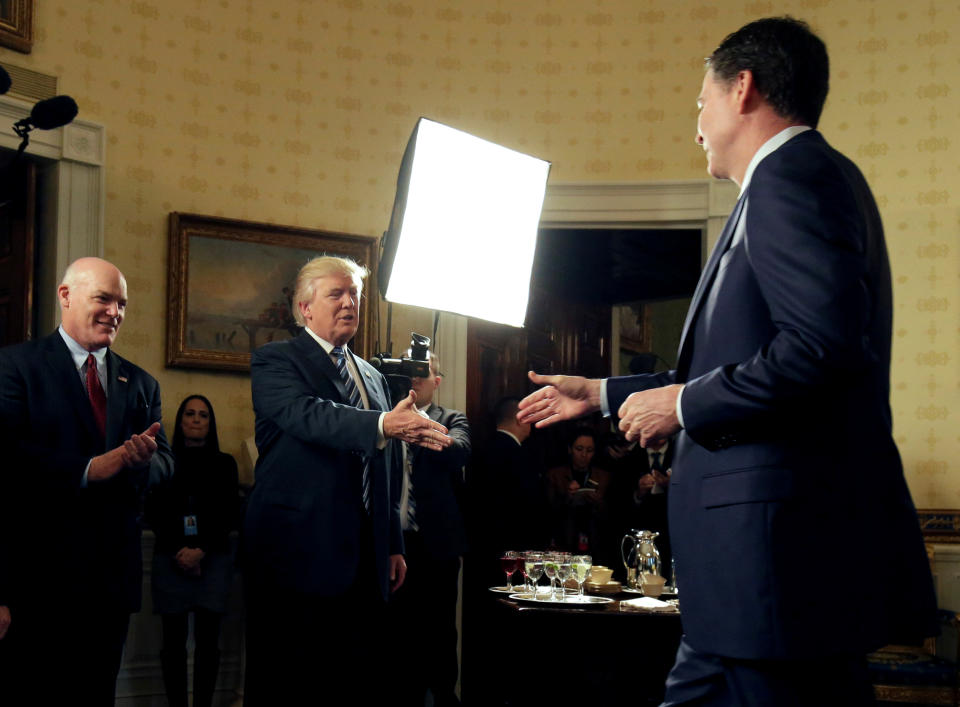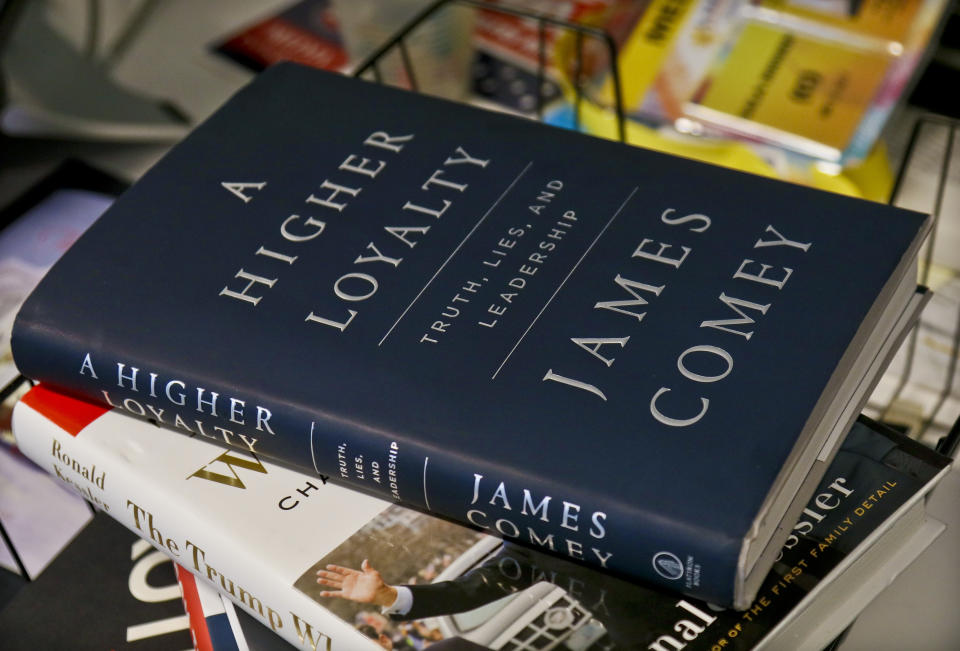Why Comey doesn't want Trump impeached
Former FBI Director James Comey revealed Sunday night that he was advised by his chief counsel that President Trump could wind up as a target of the bureau’s investigation into suspected links between Trump campaign operatives and the Kremlin. That fact, Comey said, was one reason he refused the president’s repeated requests that he publicly clear him of any wrongdoing in the probe.
Comey’s comments came during a wide-ranging interview in which the former FBI chief, who had long prided himself on being above the political fray, unloaded on the president who fired him in unusually personal and caustic terms, describing Trump as a congenital liar who was “morally unfit” to serve in the White House.
In perhaps his most striking remarks, Comey even appeared to call on the American people to vote Trump out of office.
When asked by ABC anchor George Stephanapoulos if President Trump should be impeached, Comey replied: “I think impeaching and removing Donald Trump from office would let the American people off the hook and have something happen indirectly that I believe they are duty-bound to do directly. People in this country need to stand up and go to the voting booth and vote their values.”
Comey’s strong language — unprecedented for a former FBI director — could be seen in part as a response to the president’s relentless attacks on him. In just the last few days, as Comey’s about-to-be-released book, “A Higher Loyalty,” has begun getting media attention, President Trump has tweeted repeatedly about him, calling Comey a “slime ball,” a “liar,” and a “leaker.”
The war of words aside, Comey’s interview was perhaps more significant for shedding new light on the thinking within the FBI about the president’s potential liability in the Russia probe.
When Comey originally told Trump that he was not personally the target of the FBI probe — information that he volunteered at a meeting at Trump Tower on Jan. 6, 2017 — he did so against the advice of his chief lawyer.

“The FBI general counsel was concerned about me in the first instance telling then President-elect Trump he wasn’t under investigation,” Comey said, according to a transcript of the full interview, only portions of which were aired on the Sunday night broadcast. “It — it was— potentially misleading and also would create a duty to correct that. And there was a challenge also with, so what’s the limiting principle? If they ask, ‘Is the vice president under investigation?’ do you answer that?”
Comey described how, nevertheless, Trump repeatedly pushed him to make a public declaration that he was not being investigated by the FBI. Even though he had already privately told congressional committees that Trump was not a target, Comey resisted doing so publicly — in part, he suggested, because of the advice he got from his general counsel. (That general counsel, James Baker, has since been removed from that position.)
“So he [the president] was calling me to tell me how frustrating he found that and it was getting in the way of his ability to make deals for the country,” Comey said. “And he wanted to lift the cloud; he called it a cloud. And so wanted me to get out that he wasn’t under investigation.”
But this time, Comey had become convinced that Trump himself might be engaging in obstruction of justice, especially after the president asked him at one meeting that he “hopes” the FBI could drop its investigation into former national security adviser Michael Flynn. Comey documented that request — which he said he took as “direction” — in one of several memos he wrote to leave a record of his communications with Trump.
“What part of you is thinking also, ‘I am collecting evidence on the president’?” Stephanopoulos asked Comey.
“Well, part of me is thinking that because of the … potential obstruction issue,” Comey said. “But also I continued to believe that there was force to the FBI general counsel’s argument that we’re going to have to look at the president. … You’re inevitably going to look at his conduct, because he’s the head of the campaign.”
For all his criticism of Trump, Comey didn’t spare himself. He acknowledged that he most likely made a “mistake” when he accepted a compromise of sorts with Trump during a private dinner at the White House, partly because he was startled by the president saying, “I expect loyalty; I need loyalty.”

Comey elaborated on a tense conversation that he first recounted during Senate testimony last year.
At first, Comey said, when Trump made the loyalty request, “I couldn’t say yes, I couldn’t nod, and so I just froze and stared at him.” When Trump pressed him a second time, he said he replied, “You will always get honesty from me.
“And he paused, and then he said, ‘Honest loyalty,’ as if he was proposing some compromise or a deal. And I paused and said, ‘You’ll get that from me.’ And, of course, in between those two — the loyalty sandwich, in between those two, I had — I had an opportunity to explain to him the FBI’s role and how important it was for the FBI to be independent and how I thought about it,” Comey said.
“But did you cross a line there — did you cross a line when you promised him honest loyalty?” Stephanopoulos asked. “Would it be fair for [Trump] to think, ‘Wait, I have a deal here.’ … Was it a mistake?”
“Maybe,” Comey replied. “Maybe I should’ve been tougher or more direct, especially given what I know now. At the time, I obviously couldn’t see the future. But given what I know now, maybe it would’ve been better to give a more explicit — say, ‘Sir, I can’t promise you loyalty. Given the nature of my role, I can promise you I’ll always tell you the truth,'” Comey said. “But in the moment, frankly, it didn’t occur to me. And I — maybe I didn’t have the guts to do it.”
Read more from Yahoo News:
Ex-top CIA official: Brennan is doing Putin’s ‘bidding’ by speculating about Trump blackmail
Trump’s incoherent, dangerous policy on Syria, as laid out in tweets
Photos: The World Press Photo of the Year 2018 goes to Venezuelan photographer Ronaldo Schemidt
(Photo credit: Illustration: Yahoo News; photos: Ralph Alswang/ABC via AP, AP, Soren Larson/Reuters)

 Yahoo News
Yahoo News 


